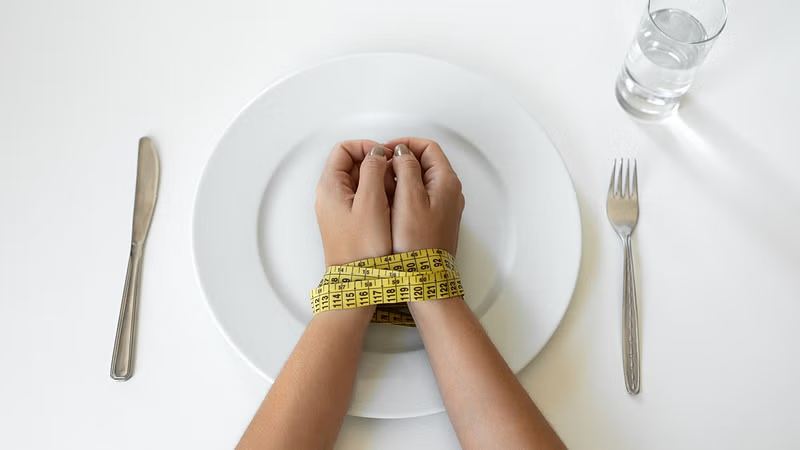What Really Happens When You Eat Less
The idea of “starvation mode” has been widely discussed in the fitness and weight loss community, often warning people that eating too little will make their body hold onto fat instead of burning it. But is this really true? Can your metabolism completely shut down and prevent weight loss if you don’t eat enough?
Let’s break down the science behind “starvation mode” and separate fact from fiction.
🤔 What Is “Starvation Mode”?

The term “starvation mode” suggests that when you drastically reduce your calorie intake, your body reacts by slowing down metabolism and storing fat instead of burning it. The claim is that eating too little prevents weight loss, no matter how much you exercise.
While there is some truth to the idea that your body adapts to lower calorie intake, the extreme version of “starvation mode” is a myth. The body doesn’t just stop burning fat—it adjusts, but not in the way many people think.
🧪 The Science: Does Eating Less Stop Weight Loss?
✅ Fact 1: Your Metabolism Does Slow Down—But Not Enough to Stop Fat Loss
When you eat fewer calories than your body needs, you enter a caloric deficit, which is required for weight loss. Your body does adjust by slowing down certain functions, like reducing non-essential energy use (e.g., fidgeting, spontaneous movement), but it does not completely stop burning fat.
📌 Example: Studies on extreme calorie restriction (such as those on people during famines or contestants from The Biggest Loser) show that while metabolism slows down, weight loss continues as long as a caloric deficit exists.
✅ Fact 2: The Body Uses Stored Fat for Energy—It Doesn’t “Hold Onto It”
The human body is designed to use stored fat for energy when food is scarce. If you eat less, your body doesn’t “panic” and store fat; instead, it burns fat to compensate for the missing calories.
📌 Example: If “starvation mode” truly worked the way some claim, people suffering from extreme food deprivation wouldn’t lose weight—but we know that severe calorie restriction always leads to fat and muscle loss over time.
✅ Fact 3: Long-Term Extreme Dieting Can Cause Muscle Loss
While the body continues burning fat during a calorie deficit, very low-calorie diets (under 1,200 calories per day for most people) can lead to muscle loss. This happens because when your body lacks enough energy, it may break down muscle for fuel, slowing metabolism over time.
📌 Solution: If you’re aiming to lose weight, strength training and eating enough protein can help preserve muscle and keep metabolism healthy.
🚀 How to Avoid Unhealthy Metabolic Slowdown
While “starvation mode” doesn’t prevent weight loss, extreme dieting can have negative effects. Here’s how to lose weight without harming your metabolism:
✅ Create a Moderate Caloric Deficit – Aim for 300–500 fewer calories per day, instead of extreme restriction.
✅ Eat Enough Protein – Helps maintain muscle and supports metabolism.
✅ Strength Train – Prevents muscle loss and keeps metabolism high.
✅ Take Diet Breaks – Short periods of increased calories can help balance hormones and metabolism.
✅ Prioritize Sleep & Stress Management – Poor sleep and high stress can slow down weight loss.
🚫 The Real “Starvation Mode” – When Dieting Goes Too Far
Though mild metabolic slowdown is normal, true starvation mode happens in cases of extreme calorie deprivation, like long-term malnutrition or eating disorders. This can lead to:
❌ Hormonal imbalances (thyroid, leptin, ghrelin)
❌ Extreme fatigue & weakness
❌ Muscle wasting
❌ Nutrient deficiencies
But this only happens in extreme cases—not from simply eating fewer calories to lose weight.
💡 The Truth About “Starvation Mode”
🚀 Weight loss happens as long as you are in a caloric deficit.
⚠️ Your metabolism slows slightly, but not enough to prevent fat loss.
💪 Eating too little can cause muscle loss, making weight loss harder in the long run.
🔑 Sustainable, balanced dieting is key to long-term results.
So, next time you hear someone say, “I’m not losing weight because I’m in starvation mode,” you’ll know the real science behind it! 😉
Would you like a sample meal plan to help with healthy, sustainable weight loss? Let us know! 🔥
